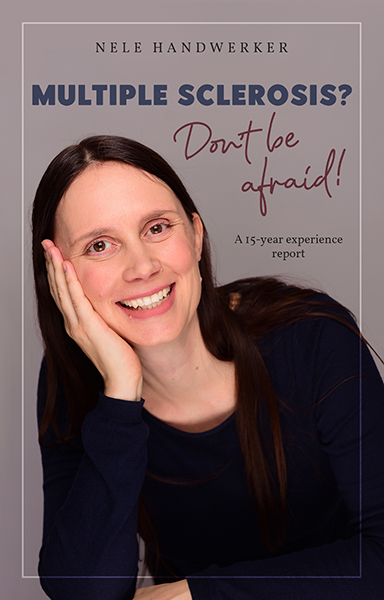Today I’m talking to Paola Kruger, Patient Expert at EUPATI in Rome, Italy. Paola lives with the diagnosis of multiple sclerosis herself and helps to improve the life of MS patients in Italy with her expertise. After sharing her own story, she provides inside views into the treatment, care and the challenges of the support system in Italy.
Klicken Sie auf den unteren Button, um den Podcast zu laden.
Table of Contents
Introduction Paola Kruger
My name is Paola, I live in Rome with two kids and two cats. I have a great passion for languages and clinical research. My interest in clinical research started after my diagnosis of MS, but ever since it has been so fascinating to understand how medicines are developed and what role patients can have in this process.

Personal Experiences and Coping Strategies
Can you briefly share your personal journey with MS and how it has impacted your life?
In 2010 I experienced optic neuritis. At the time I didn’t know anything about optic neuritis or MS, I only knew I wasn’t seeing well from one eye. However, I have to say even my GP told me I needed to get an MRI as soon as she found out I had optic neuritis. In a way I was lucky, because having experienced such a specific symptom strongly connected with MS I was diagnosed very quicky.
In your experience, what are some of the most effective coping strategies or self-care practices for managing the daily challenges of living with MS?
In time I have come to realise that we all react in different ways to the disease and that it is impossible to have one recipe for all. It very much depends on the kind of person you are. For me, for example, as I am a very curious person, I had this sudden urge of finding out as much as possible about the disease and where the medicines I was asked to take come from. Knowledge helped me to put everything into perspective and also to understand that I had several options and that my life was not over, as you initially think when you are diagnosed.
How important is mental health and emotional well-being for individuals with MS, and what support is available in this regard?
They are fundamental. First of all MS is a disease that takes you on an emotional rollercoaster as part of the symptoms, but on top of that you have to cope with accepting a life-long disease and the problems it creates in your life.
In my country this aspect is very neglected. For example, we don’t have a right to a consultation with a psychologist once we are diagnosed, as cancer patients do, and psychological services are very limited anyway and dependent on what kind of resources your hospital has at that moment. You have to either rely on charities, but often you have to wait quite a bit to get an appointment and when you are diagnosed you really cannot wait! Or you have to go private and pay for it yourself. Something that many MS patients sadly do to get the help they need.
Not to mention about well-being…that is more or less all private, except some initiatives that normally last for a limited amount of time.
Treatment and Care in Italy
What types of MS treatments, therapies, or interventions are more commonly recommended or accessible in Italy (e.g., certain types of DMTs, aHSCT, rehab)?
We are very lucky as far as treatments are concerned because we have access to all approved DMTs. As far as I know only very few selected cases have access to HSCT because of the risks involved. The sore point is rehab because despite having excellent rehab centres and staff resources are not sufficient and very few people manage to get a publicly funded placement, the majority of people have to go private and pay for it out of their own pockets. Very shameful.
Can you share any recent advancements or developments in MS treatment, care, or support in Italy that you find particularly promising?
In Italy there is a lot of research into neural stem cell transplantation. Professor Martino, from the S Raffaele Hospital in Milan, is one of the leading scientists in this field and some promising results have been achieved already.
There is also interesting research going on concerning diet and a possible link with MS progression.
Italy is also one of the countries where a lot of research on the BTK inhibitors is taking place, probably the next class of medicines to seek approval in the near future.
So, all in all, we should be thankful of the many initiatives taking place in our country.
Challenges and Support Systems in Italy
Can you provide an overview of the healthcare system in Italy and how it supports individuals living with MS?
MS care is provided by MS centres, a sort of one-stop shop for MS care from diagnosis to treatment and follow up, which is convenient as you can find all the medical support you need in one place.
What types of healthcare professionals are typically involved in the care and management of MS in Italy, and what role do they play?
The central figure of MS care is, of course, the neurologist, who, in Italy, is a specialist in MS, not just any neurologist. He/she is responsible for all medical decisions and should also direct you to where to find additional information and help you to take an active role in your MS care. Then you have dedicated MS nurses, who oversee the daily running of the MS centres, dispense IV treatments or teach you how to take your medication (for example when you have to auto-inject). On top of that, depending on the resources of the hospital, you have other specialists there are available for MS patients on specific days depending on their symptoms (like the neuro-ophtalmologist) or related co-morbidities (like thyroid issues). Your neurologist might refer you to one of these specialists or send you to a neuropsychologist (if available on site) for cognitive testing and some psychological support in very limited cases.
Are there any specific resources or support networks available for MS patients in Italy, such as patient associations or community organizations?
There is a main MS society and a couple of additional organisations who play a minor role.
Education, Awareness, and Advocacy
Are there any specific initiatives or programs in Italy that focus on raising awareness about MS and educating the public about the condition?
Initiatives on MS usually start from MS charities, either with funding initiatives that at the same time raise awareness or through dedicated initiatives in different hospitals or on World MS Day. Also, a lot of educating work is done by HCPs in their MS centres.
There aren’t specific initiatives organized by the Ministry of Health.
How can individuals with MS in Italy actively advocate for themselves and ensure they receive appropriate care, support, and accommodations?
Italy has a universalistic health system so all citizens get access to care. As for support the best course of action is to speak to the local MS society branch, as they advocate at the national level for the needs of people with MS.
What role do family members and caregivers play in supporting individuals with MS in Italy, and what resources are available to support them?
I think caregivers and family members play a fundamental role and in Italy, like more or less everywhere, they are not recognized sufficiently. In Italy you can get additional days off if you care for someone with MS and in 2022 a fund for family members caring for severely disabled MS patients has been set up so they can have access to some measures of support but other than that too much of the burden is still on the caregiver. The role of the caregiver should be addressed at a global level and given proper status, not just left to individual initiatives.
What advice would you give to individuals with MS in Italy who may be feeling overwhelmed or discouraged? How can they maintain a positive outlook?
When you are diagnosed it is difficult to see beyond the problems, symptoms and negative outlook on the future, however, I would like people to know that MS has changed a lot in the last few years, we have new highly effective treatments and a lot of interesting research is going on in the MS field. If once upon a time MS meant a wheelchair and a gloom future thanks to recent progress more and more people with MS go on to live a normal life. If you have moments of discouragement look for positive examples of people living with MS. You will find plenty of those and understand that there is a fulfilling life beyond the disease.
Quickfire Q&A Session
Complete the sentence: "For me, multiple sclerosis is...."
A life changer, both in a negative and a positive sense.
Which website can you recommend for people living with MS in Italy?
The MS Society website: www.aism.it
You can find all the information concerning MS and support they offer.
What development would you like to see in the field of multiple sclerosis in the next 5 years?
I would like more emphasis on invisible symptoms like cognitive issues, emotional swings and depression, I mean not just curing the progression of the disease but also the quality of life side of living with it.
I also wish more research was done on the topic of getting older with MS, all resources are concentrated on younger patients, but thanks to the new treatments people with MS get older in better shape and many aspects of their lives are not taken into consideration, like, for example, menopause and MS.
Farewell
Finally, what message of hope or encouragement would you like to share with individuals living with MS in Italy?
When they tell you that you can achieve your life objectives despite MS, please believe it, because you can!
How and where can interested people find you online?
You can easily connect with me on LinkedIn.
A big thank you to Paola Kruger for her openness and all her engagement for people living with multiple sclerosis in Italy.
See you soon and try to make the best out of your life,
Nele
For more information and positive thoughts, subscribe to my newsletter for free.
Click here for an overview of all podcast episodes published so far.

And at many more places.
* This text contains affiliate links. This means that I get a small compensation if you buy the product recommended by me through the link. For you nothing changes in the price of the product. And it helps me to pay for the blog and to write new posts.










